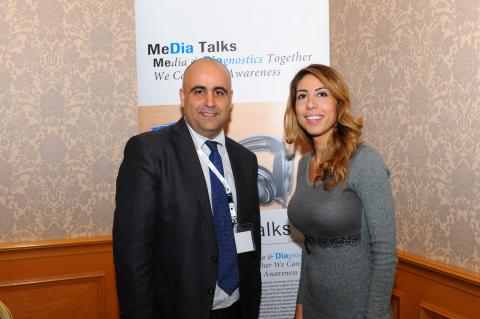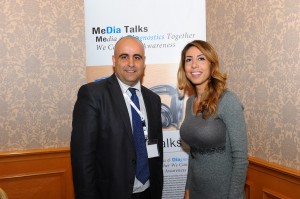
- First trimester screening for chromosomal and structural abnormalities is important in risk assessment for conditions such as Down syndrome
- This non-invasive screening can be used to determine whether a mother should consider a diagnostic test
November 14th, 2014, Beirut, Lebanon: To highlight and raise awareness around the importance of first trimester screening during pregnancy and its benefits for mothers-to-be across Lebanon, medical specialists addressed media professionals in an interactive educational session. The event, titled MEDia Talks, was held at the Habtoor Hilton, Beirut and hosted by Roche Diagnostics Middle East. It was attended by journalists and key opinion leaders, including Dr. Bernard Nasr, Fetomaternal Specialist at Clemenceau Medical Center, Notre Dame University Hospital, and Haykal Hospital, Lebanon.
The first trimester screening is a non-invasive evaluation that includes a maternal blood screening test in combination with an ultrasound evaluation. This screening can identify the risk for specific chromosomal abnormalities such as Down syndrome. Another portion of the test - nuchal translucency which is the fluid beneath the skin behind the baby’s neck - can also assist in identifying other significant fetal abnormalities, such as cardiac disorders.
The screening is performed in the first trimester, usually between the 11th and 13th week of pregnancy. The blood screen measures two pregnancy related hormones: free beta hCG and PAPP-A. The ultrasound evaluation measures nuchal translucency. In babies who are at an increased risk for chromosomal abnormalities, abnormally high or low hCG and PAPP-A levels are often found and there is often increased fluid in the nuchal translucency.
Based on the results, along with other risk factors, such as maternal age, the parents can consider if diagnostic testing or an amniocentesis (second trimester) are necessary. Further testing can confirm a diagnosis which allows parents the opportunity to make a decision about carrying the child to term, identify support groups and resources, plan for a child with special needs, and/or address anticipated lifestyle changes.
First trimester screening is particularly important in the region as according to the Catalogue for Transmission Genetics in Arabs (CTGA) Database the incidence of Down syndrome is higher than international figures. Also, there are serious complications associated with Down syndrome which are prevalent in the region. Some of these complications, listed from studies from Lebanon, Egypt, Bahrain, Kuwait, Palestine, Qatar and Lebanon, include acute leukemia and impairment of increased susceptibility to infections and congenital heart disease.1
About Roche
Headquartered in Basel, Switzerland, Roche is a leader in research-focused healthcare with combined strengths in pharmaceuticals and diagnostics. Roche is the world’s largest biotech company, with truly differentiated medicines in oncology, immunology, infectious diseases, ophthalmology and neuroscience. Roche is also the world leader in in vitro diagnostics and tissue-based cancer diagnostics, and a frontrunner in diabetes management. Roche’s personalised healthcare strategy aims at providing medicines and diagnostics that enable tangible improvements in the health, quality of life and survival of patients. Founded in 1896, Roche has been making important contributions to global health for more than a century. Twenty-four medicines developed by Roche are included in the World Health Organisation Model Lists of Essential Medicines, among them life-saving antibiotics, antimalarial and chemotherapy. In 2013 the Roche Group employed over 85,000 people worldwide, invested 8.7 billion Swiss francs in R&D and posted sales of 46.8 billion Swiss francs. Genentech, in the United States, is a wholly owned member of the Roche Group. Roche is the majority shareholder in Chugai Pharmaceutical, Japan. For more information, please visit www.roche.com. About Roche Diagnostics Middle East
Roche have taken the unprecedented move of being the first IVD company to have a Management Center and a logistics hub in the Middle East. Roche has extended its ownership of the entire supply chain, quality control and customer support all the way into the centre of the region. This base of operations reinforces the commitment to global Roche Standards and is driven by a full team of vastly experienced specialists offering a complete portfolio of services. With this regional empowerment, Roche has moved its leadership and decision-making closer to its customers and distributors. Roche Diagnostics also recently announced the establishment of a direct sales affiliate in Egypt to better meet the needs of the country's healthcare sector. These investments allow Roche Diagnostics Middle East to develop from being a supplier into becoming the preferred IVD partner for its customers.
Reference
1. Centre for Arab Genomic Studies. Down syndrome in the Arab world. 2013. http://www.cags.org.ae/Down%20Syndrome-English.pdf
Categories
- Log in to post comments
